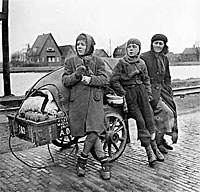Shopping for Healthy Holiday Foods to Fight Obesity and Cancer

Healthy Grocery Foods list (.pdf)
click to print or download
from M D Anderson website.
Before you head out to the grocery store to stock up on holiday foods you might like to print or download this 45 healthy foods shopping list pulled together by Mary Ellen Herndon, wellness food specialist, and other experts at The University of Texas MD Anderson Cancer Center.
Evidence for obesity as a promoter of several types of cancer as well as heart disease and diabetes in increasing. Adults can avoid holiday weight gain, Herndon says, by stocking up on the cancer-fighting foods on this holiday food grocery list. Naturally, the list is rich in vegetables and fruits — from acorn squash, berries and dates to pears, quinces, sweet potatoes, Swiss chard and turnips– and in grains, beans, and lean non-red meat protein sources. Also included are pecans, pistachios, walnuts, and dark chocolate.
“Plant foods are packed with cancer-fighting nutrients,” Herndon says. “So, make sure you fill two-thirds of your plate with vegetables, fruits, whole grains or beans. On the remaining one-third of your plate, choose a lean animal or plant protein.”
Men should aim for meals with no more than 500 calories, she adds, and women aim for no more than 400 calories.
“People tend to gain weight in colder months because they’re indoors more, less active and overeat high calorie, holiday foods,” said Herndon says. “And, unhealthy weight gain, in the long-run, may make it harder for the body to fight off diseases like cancer.”
Currently, NIH factsheet for Obesity and Cancer Risk lists just 8 types of cancer by name: Esophagus · Pancreas · Colon · and rectum · Breast (after menopause) · Endometrium (lining of the uterus) · Kidney · Thyroid · Gallbladder.
So what about prostate cancer? Studies are beginning to demonstrate that obesity is associated with prostate cancer aggressiveness and survival chances.
Prostate enlargement (BPH) is common with aging and obesity. But even in men who do not develop BPH, Vanderbilt University researchers have found, there are links between prostate cancer and obesity.
And by examining what happens to fat genes if a thicker than normal layer of fat builds up around the prostate, a team of Canadian, Portuguese and Spanish geneticists and oncologists have discovered one way that obesity promotes aggressive prostate cancer (more to come on this in our MedNews section).
Meanwhile, to make your holiday food shopping list nice, not naughty (except for a bit of dark chocolate), follow Mary Ellen Herndon’s lead and select from these foods:
Fresh, in-season fruits and vegetables
Acorn squash
Belgian endive
Broccoli
Brussels sprouts
Butternut squash
Cauliflower
Cranberries
Dates
Garlic
Kale
Leeks
Mushrooms
Pears
Persimmons
Pomegranates
Pumpkin
Quince
Sweet potatoes
Swiss chard
TurnipsGrains
Quinoa
Wild rice
Brown rice
LentilsDairy
Skim milk
Non-fat Greek yogurtProtein
Lean turkey or chicken
Lean fish such as salmon, halibut, redfish or red snapper
Tofu
Almonds
Pistachios
Walnuts
Pecans
Garbanzo beans/chickpeas (low sodium if canned)
Black, red, pinto or white beans (low sodium if canned)Frozen foods
Get more nutrients by buying this out-of-season produce frozen.
Berries (preferably organic)
Carrots
Collard greens
Green beans
Rhubarb
Sweet cornBaking aisle
Cinnamon
Cooking spray
Dark chocolate
Whole wheat flour



 In Holland in 1944-45 during World War II a food embargo led to famine. Research indicates that children conceived during the Dutch Hunger Winter experienced detrimental health effects six decades later. Pre-natal exposure to the famine has been associated with
In Holland in 1944-45 during World War II a food embargo led to famine. Research indicates that children conceived during the Dutch Hunger Winter experienced detrimental health effects six decades later. Pre-natal exposure to the famine has been associated with 


